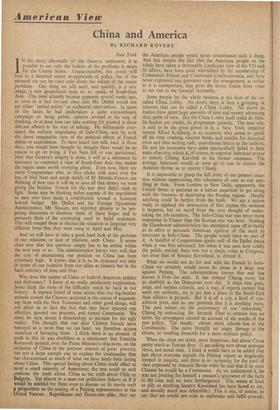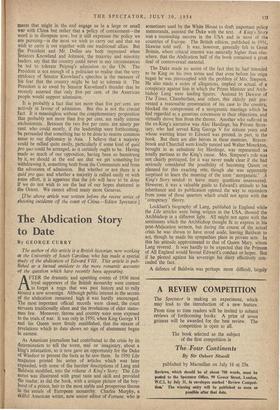China and America
By RICHARD ROVERE
New York IN the dusty aftermath of the Geneva settlement, it is possible to sec only the bulkier of the problems it raises for the United States. Unquestionably, this event will lead to a hundred minor re-appraisals of policy, but at the moment we can be clear only about the nature of the major problems. One thing we will need, and quickly, is a new image, a new geopolitical map, so to speak, of South-East Asia. This need actually became apparent several weeks ago, as soon as it had become clear that Mr. Dulles would not get either ' united action' or unilateral ,intervention. In quest of the latter, he had undertaken a quite extraordinary campaign to bring public opinion around to his way of thinking, or at least (one can take nothing for granted in these delicate affairs) to his way of talking. He deliberately over- stated the military importance of Indo-China, and he took the direst imaginable view of the political effects of French defeat or capitulation. To have heard him talk, back in those days, you would have thought he thought there would be no reason to go on living if Viet Nam fell or was partitioned. Now that Geneva's surgery is done, it will at a minimum be necessary to construct a view of South-East Asia that makes the region seem worth worrying about. Even now, there are many Congressmen who, as they choke with tears over the loss of Viet Nam and speak darkly of M. Mendes-France, are thinking of how nice it will be to save all that money we were giving the feckless French for the war they didn't wish to fight. Some may be thinking rather warmly of the negotiators as men who have made a contribution toward a balanced federal budget. Mr. Dulles and the Foreign Operations Administrator, Mr. Stassen, are reported already to be pre- paring discourses to disabuse them of these hopes and to persuade them of the continuing need to build resistance. This will compel them to discuss the situation in language very different from that they were using in April and May.
And we will have to take a good hard look at the problem of our relations, or lack of relations, with China. It seems clear now that this question simply has to be settled within the next year or so. The administration knows very well that the cost of maintaining our position on China has been extremely high. It knows that it is to be ,reckoned not only in terms of our isolation from our allies at Geneva but in the hard currency of time and lives.
Why does this matter of China so bedevil American politics and diplomacy? I know of no really satisfactory explanation. Some think the roots of the difficulty reach far back in our history. A learned friend of mine insists that our big-brother attitude toward the Chinese, acquired in the course of acquaint- ing them with the New Testament and other good things, will not allow us to face the fact that they have spurned our affection, ignored our precepts, and turned Communist. We must, he says, invent a demonology to account for the ugly reality. The thought that our dear Chinese friends have betrayed us is more than we can bear; we therefore accuse ourselves of betraying them. I think there is an element of truth in this .(it was doubtless as a missionary that Franklin Roosevelt insisted, over the Prime Minister's objections, on the inclusion of China in the postwar concert of great powers), but not a large enough one to explain the irrationality that has characterised so much of what we have lately been saying about China. This special feeling about China could affect at most a small minority of Americans; the rest could as well confront the truth about China as the truth about Chile or Bulgaria. Yet almost to a man our politicians behave as if it would be suicidal for them even to discuss on its merits such # proposition as the seating of. a Peiping representative in the United. Nations. Republicans and Democrats alike, they say the American people would never countenance such a thing. And this despite the fact that the American people on the whole have taken a thoroughly Laodicean view of the UN and its affairs, have been quite untroubled by the membership of Communist Poland and Communist Czechoslovakia, and have never expressed any grievance over the arrangement, as unfair as it is unimportant, that gives the Soviet Union three votes to our one in the General Assembly.
Some people lay the whole business at the door of the so- called China Lobby. No doubt there is here a grouping of interests that can be called a China Lobby. No doubt its leaders have spent large amounts of time and money advancing their point of view. But the China Lobby itself could do little. Its leaders are cranks, its programme quixotic. The man who is said to be the great power in it, a New York importer named Alfred Kohlberg, is an eccentric who seems to spend all his time combing obscure books and articles for doctrinal error and then writing rude, quarrelsome letters to the authors. He and his associates have quite spectacularly failed in their main objective, which is; of course, to organise Atherican power to restore Chiang Kai-shek to his former eminence. The average American would as soon go to war to restore the Austrian throne as to restore Chiang.
It is impossible to grasp the full irony of our present situa- tion without appreciating this reluctance of ours to risk any- thing in Asia. From London to New Delhi, apparently. the United States is pictured as a nation impatient to get along with the business of destroying the Peiping regime. Hardly anything could be further from the truth. We are a nation ready to applaud the destruction of that regime the moment it happens, but we recoil from the very thought of under- taking the job ourselves. The Indo-China war was never more unpopular in France than the Korean war was here. Nothing the Eisenhower administration has attempted came off so badly as its effort to persuade American opinion of the need to intervene in Indo-China. The people would have no part of it. A handful of Congressmen spoke well of the Dulles thesis when it was first advanced, but when it was seen how coldly the public reacted there was not a single voice in Congress. not even that of Senator Knowland, to defend it.
What we would not do for and with the French in Indo- China we certainly would never do alone in a large war against Peiping. The administration knows this and has known it from the start. It has treated Chiang every bit as shabbily as the Democrats ever did. It ships him guns, jeeps, and surplus colonels, and it may, if reports current this week are authentic, try to get him a place in the South-East Asia alliance it projects. But it is all a sop, a kind of con-' solation prize, and no one pretends that it is anything more. This past winter, on the anniversary of our unleashing' Chiang by instructing the Seventh Fleet to restrain him no more, the newspapers carried an account of the results of the new policy. The results: eleven more islands lost to the Communists. The news brought no angry throngs to the streets, no swelling demands for a more militant policy.
When the chips are down, most Americans feel about China pretty much as Europe does. (I am talking now about strategic views, not moral ones. I think it would have to be added that just about everyone regards the Peiping regime as hopelessly steeped in iniquity, and there is no sympathy for the kind of view expressed by Aneurin Bevan when he said that if he were Chinese he would be a Communist. As we understood it, he was not positing for himself a peasant's ignorance of the facts in the case, and we were flabbergasted. This seems at least as silly as anything Senator Knowland has been heard to say, and morally much less defensible.) This is not, of course. to say that we would not wish to undertake and fulfil commit- meats that might in the end engage us in a large or small war with China but rather that a policy of containment—the word is in disrepute now, but it still expresses the policy we are pursuing—is the most we wish to carry out and that we wish to carry it out together with our traditional allies. But the President and Mr. Dulles are both impressed when Senators Knowland and Johnson, the majority and minority leaders, say that the country could never in any circumstances be led to tolerate Peiping's admission to the UN. The President is not enough of a politician to realise that the very stridency of Senator Knowland's speeches is the measure of his fear that the country might be led to tolerate it. The President is so awed by Senator Knowland's thunder that he recently asserted that only five per cent. of the American people would support admission.
It is probably a fact that not more than five per cent. are actively in favour of admission. But this is not the crucial fact. It is meaningless without the complementary proposition that probably not more than five per cent. are really intense exclusionists. Between the two five per cents. are ninety per cent. who could mostly, if the leadership were forthcoming, be persuaded that something has to be done to restore common sense to our diplomacy in Asia. I believe that a majority could be rallied quite easily, particularly if some kind of quid pro quo could be arranged, as it certainly ought to be. Having trade so much of our opposition, having been so hamstrung by it, we should at the end see that we get something for withdrawing it, something both' from the Communists and from the advocates of admission. But whether or not there is a quid pro quo, and whether a majority is rallied easily or with some effort, it is apparent that the job will have to be done if we do not wish to see the last of our hopes shattered in the Orient. We cannot afford many more Genevas.
[The above article was written before the recent series of shooting incidents off the coast of China—Editor Spectator.]



































 Previous page
Previous page